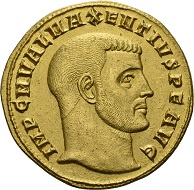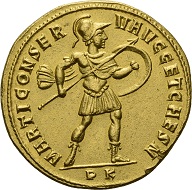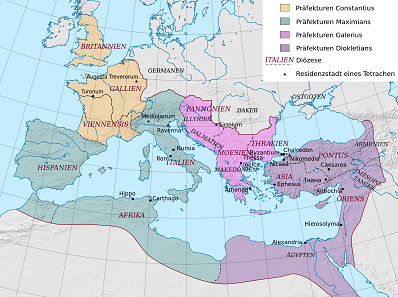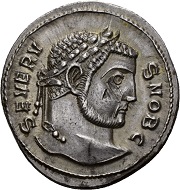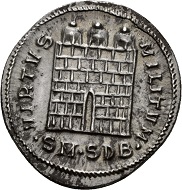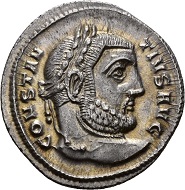It was an eventful year, the year AD 307, when the quadruple gold coin bearing the portrait of Maxentius was minted in Carthage. Hess-Divo offer it at their auction 334.
Maxentius, 306-312. Quaternion (4 aurei), Carthage, 307. Spectacular unique from the Partinico hoard of the late 50s. From Hess-Divo auction 334 (May 29th, 2018), no. 135. Extremely fine. Est.: CHF 100,000.
On the back, it shows Mars Conservator, Mars the preserver. Now, the Roman god Mars must under no circumstance be confused with his Greek equivalent, the “man-slaughtering Ares”, as he is referred to in the Iliad. Mars is the god of war who supports those defending their home. Mars fights with all the virtues that characterize a true man – with courage, devoutness and reverence for traditions. Mars is the incarnation of righteous war, which the Romans claimed for themselves.
Maxentius did not chose this image randomly. On the contrary, he used it to set himself apart from his competitors and to proclaim a political program. Which was that? In order to understand that, we need to return to the eventful year of 307.
The starting point in AD 305: The partitioning of the Roman Empire under Diocletian. Hellerick / Wikipedia, cc-by 4.0.
At the time, many were struggling for power over the Roman Empire. Diocletian had abdicated on May 1st in 305 and appointed his successors. Constantius Chlorus was to be in control of the West with the support of Severus, and Galerius of the East, together with Maximinus Daia. Thus, not only Diocletian’s colleague Maximianus Herculius fell short, who grudgingly accepted his abdication, but above all the sons of Constantius Chlorus and Maximianus Herculius. Diocletian, who had no children, had misjudged the situation and passed over their entitlements.
We are not going to retrace all the battles and political dodges that led to these very sons, Constantine I and Maxentius, becoming essential factors of power. Let us jump right into the year 307. At this point, Constantine I had already been established as ruler over Gaul, Spain and Britain. Maxentius was domiciled in Rome. He had taken advantage of the fact that Galerius tried to abolish the tax exemption of the Roman population. It was foolish of Galerius to simultaneously announce that the Praetorians were supposed to give up their comfortable garrison in Rome in order to serve at the front. Citizens and soldiers together called Maxentius for help – an act that Galerius would not tolerate. He ordered Severus to solve the problem.
But Maxentius had a trump card: his father Maximianus Herculius, who was sulking in Lucania. When his son sent the message saying he needed him, Maximian instantly rushed to Rome, eager to once more pull the strings of international politics.
Maxentius had hoped that his father was still more popular with the army than Galerius or Severus, which was indeed the case. But Maximian wanted to be emperor himself again. And thus, after his arrival in Rome, he simply pushed Maxentius aside and, in February 307, had himself once more be pronounced Augustus by the people and the senate.
Severus. Argenteus, Serdica, 305-306. From Hess-Divo auction 334 (May 29th, 2018), no. 134. Extremely fine. Est.: CHF 3,500.
Maximian’s first task was to defend the city against Severus. But there wasn’t much defending to do. Under Maximian, the soldiers had fought for almost 20 years, under Severus, not even two. As soon as they saw their former commander, the soldiers defected to him in droves. Severus had to flee from his own army to Ravenna, where he surrendered to Maximian. After this victory, Maximian was entirely in his element. His former power was back within reach. All he needed was an ally, and who would have been a better candidate than Constantine, his old wartime comrade’s son?
Constantine I. Argenteus, Serdica, 305-306. From Hess-Divo auction 334 (May 29th, 2018), no. 133. Extremely fine. Est.: CHF 750.
So, Maximian left business in Rome to his son Maxentius and rushed to Treves. There, the old emperor offered the young man to officially recognize him as Augustus and to adopt him. He should also marry Maximian’s daughter. In return, Maximian hoped to get military support and a clear political positioning against Galerius. But Constantine was much too smart for that. He made Maximian wait, let the statues of Severus – who in the meantime had died anyway – be canted over, and did nothing else which could have been interpreted as explicitly taking sides against Galerius.
Maximian returned to Rome without having achieved anything, where he was surprised to find that, by now, the city was in his own son’s hands. For Maxentius had succeeded, all by himself, to prevent Rome from being attacked by an army led by Galerius. Galerius too had lost soldiers who had gone over to serve the son of Maximian.
Now Maxentius had the Roman senate give him the title of Augustus and officially took over the rule in the territory of late Severus. The magnificent gold medallion is likely to have been minted in celebration of his accession to power as Augustus. With it, Maxentius underlines that he is willing and able, with the help of Mars and the associated virtues, to defend the old capital Rome against all attacks, as had done all rightful emperors before him. Thus, he positions himself against Galerius, who had tried not only to take privileges away from the Eternal City, but even to lead an army against the old capital. This way, Maxentius claims to be the true defender of the Roman idea.
At the same time, he had coins minted for Senior Augustus Maximian and Caesar Constantine.
So, Galerius saw an opposing front building up against him which to counter by himself he did not feel strong enough. He had to do something to reinforce his fading influence, and only one person came to his mind: His old supporter Diocletian should once more, with all his authority, mediate between the disputing parties. He did, only nobody listened to his suggested compromise. The fight for the Roman Empire entered the next round.
On Sixbid you can browse through the online auction catalogue of Hess-Divo Auction sale 334.




